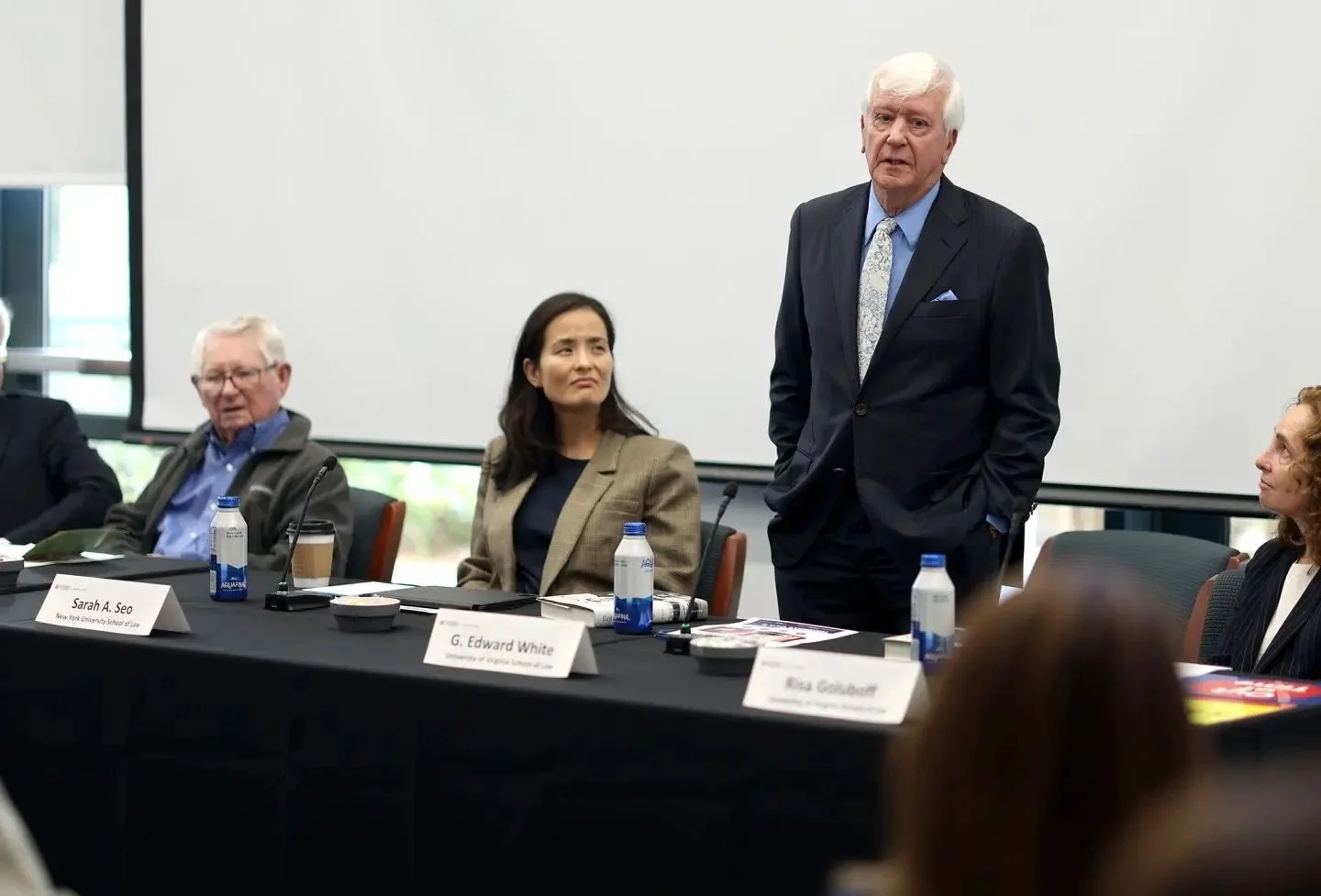Panel Discusses Professor G. Edward White’s New Book
Photo Credit: UVA Law
On Thursday, October 9, the Law School hosted a panel of legal historians to discuss Professor G. Edward White’s new book, Robert H. Jackson: A Life in Judgement. The panel consisted of Professors Sarah A. Seo of New York University, Lucas A. Powe Jr. of the University of Texas, and Ross E. Davies of George Mason University. Dean Leslie Kendrick ’06 introduced the panel and Professor Risa Goluboff moderated.
Justice Robert H. Jackson had an eventful career which included serving on the Supreme Court of the United States and as a prosecutor at the Nuremberg trials. He grew up on a farm in upstate New York and was interested in the law at a very young age. He entered the profession by “reading” for the law—he was the last Justice to lack a law degree—before starting a successful practice in Jamestown, New York and becoming involved in Democratic Party politics. After some hesitation, he was recruited by President Franklin D. Roosevelt to serve in the Bureau of Internal Revenue and then in the Department of Justice as Solicitor General and Attorney General. He then served on the Supreme Court from 1941-1954. He took leave from the Court for two years to serve as the American prosecutor at the Nuremberg trials for Nazi war criminals after the Second World War.
Justice Jackson has always been known as a brilliant jurist—Judge Richard Posner once called him the “last real star” on the Supreme Court—and a major figure in American legal history. Professor White stressed his ability to learn new areas of law from the ground up as well as his complicated relationship with the other justices. However, Justice Jackson always lacked a serious biography. Professor White’s book fills this lacuna.
Professor Seo asked about Justice Jackson’s time at Nuremberg. There, he advocated prosecuting under a theory of conspiracy. The approach was controversial among his international counterparts and ultimately fell flat, securing very few convictions. Later, in Krulewitch v. United States, Justice Jackson switched sides and excoriated conspiracy charges as “a serious threat to fairness in our administration of justice,” describing them as “a practice peculiar to Anglo-American law” which “does not commend itself to jurists of civil-law countries.” Professor Seo asked whether this was an attempt by Justice Jackson to “rewrite his role in history” or process his failure at Nuremberg.
Professor Powe asked about Justice Jackson’s views on the United States after returning from Nuremberg. He described him as viewing it as “homogeneous country with small, self-sufficient family farm operations, breeding self-reliant individuals . . . rural white Protestants.” He saw an exaggerated threat of Fascist or Communist subversion. As the court considered Brown v. Board of Education, he believed that segregation was naturally dying out, conflicting with Justice Hugo Black, a Southerner who recognized how entrenched racism was. In short, Professor Powe said that Justice Jackson saw an “American South that just simply didn’t exist” and did not “[understand] America at all.”
Professor Davies identified an “Easter egg” that Professor White put in his book. Justice Jackson resisted serving President Roosevelt in Washington D.C. for the first few years of his presidency. During that period, however, he sent his son to Saint Albans, “the coolest, flashiest boarding school in Washington, D.C.,” rather than to another boarding school that was closer and arguably a better fit for Justice Jackson’s values. Professor Davies said rhetorically that, based on Justice Jackson’s character as presented in the book, he wouldn’t use his son to “signal” his interest in moving to Washington. Instead, he said, somewhere there must be evidence that he “must have known” he would be appointed.
Professor White responded to each of the panelists. Responding to Professor Seo, he said that he “wouldn’t put it past Jackson” to bolster his image. To Professor Powe, he stated that he was more supportive of Justice Jackson. He argued that Nuremberg led Justice Jackson to become a great advocate of civil liberties and the First Amendment and suggested he understandably struggled to find legal arguments to end segregation. To Professor Davies, he said that Justice Jackson claimed to have chosen Saint Albans for its religious character and said that if he was angling for a government position, there were easier ways to do so.
Finally, Professor White took audience questions. When asked why Justice Jackson stayed on the Court given his frosty relationship with some other Justices, Professor White said there wasn’t a better job for him. Other potential jobs, like legal academia, just weren’t his style. Comparing Justice Jackson to the subjects of his past biographies, he said that whereas Justice Oliver Wendell Holmes was “fascinating” but “quite flawed as a person,” Professor White would have enjoyed Justice Jackson’s company.
Robert H. Jackson: A Life in Judgement is a scholarly account of an important and complex jurist.

